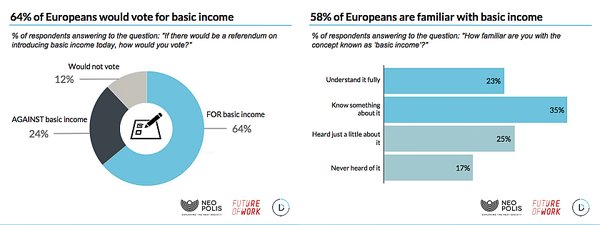Jak można przeczytać w tym artykule za wprowadzeniem gwarantowanego dochodu podstawowego jest większość Europejczyków z krajów objętych badaniem opinii. W Szwajcarii w kwietniu odbyła się olbrzymia demonstracja żądająca wprowadzenia gwarantowanego dochodu podstawowego, referendum w tej sprawie odbędzie się 6 czerwca 2016. W Finlandii i Holandii wprowadzono testujące programy pilotażowe wprowadzające gwarantowany dochód podstawowy na ograniczoną skalę. W Finlandii testowanie potrwa 2 lata poczynając od roku 2017. To co nie śni się na razie większości Polaków, a jest ideą mocno zgłaszaną i stawianą na bardzo serio przez Ruch Wolnych Ludzi i Ruch Wolnej Polski – staje się w Europie przedmiotem poważnych działań już nie w teorii, ale praktyce.
Mamy nadzieję, że Polska nie będzie się w tej sprawie ociągać i wlec w ogonie. Jeżeli Ruch Kukiza nie zacznie się domagać wprowadzenia gwarantowanego dochodu podstawowego w Polsce to za cztery lata RWL i RWP pójdzie z tym postulatem do wyborów do Sejmu i wygra. WAŻNE JEST BY RUCHOWI KUKIZA DAĆ W TEJ SPRAWIE SZANSĘ, BO JAK NA RAZIE DZIAŁA NIE POPEŁNIAJĄC WIĘKSZYCH BŁĘDÓW W DUCHU WOLNEJ POLSKI DLA WOLNYCH LUDZI. NIE NALEŻY więc DZIELIĆ niepotrzebnie SIŁ. Jeżeli jednak Ruch Kukiza, który cały czas bacznie obserwujemy nie wywiąże się z tego postulatu, to będzie trzeba stworzyć nową reprezentację Wolnych Ludzi. CB
‘Basic income’ poll: 64% of Europeans would vote in favor, 4% would stop working

The poll, conducted by German company Dalia Research in April, was the first EU-wide survey to address the proposal of a basic income, defined in the poll as “an income unconditionally paid by the government to every individual regardless of whether they work and irrespective of any other sources of income.”
The preliminary results found that about 58 percent of respondents were aware of the idea of a basic income, and 64 percent would vote in favor of the policy in a referendum.

Residents in Spain and Italy were most in favor of a basic income, with 71 percent and 69 percent saying they would vote for it, respectively.
In addition to stating whether they would vote for a basic income, participants were also asked about their biggest hopes and fears if the model was introduced.
Most of those in favor of the proposal – 40 percent – said it would “reduce anxiety about basic financing needs,” while 31 percent said it would “improve equal opportunity.”
Meanwhile, the most popular fear – expressed by 43 percent of respondents – was that basic income would encourage people to stop working. However, the survey indicated that this would not actually be the case, with around 34 percent of respondents saying that a basic income “would not affect my work choices.”
Specifically, only 4 percent of participants saying they would stop working if they had a basic income, and just 7 percent said they would reduce their working hours.
Several European countries have already begun working toward offering a basic income for their residents. Switzerland will vote on whether to introduce the model on June 5. Supporters of the initiative have suggested that each adult would receive 2,500 francs ($2,524) a month, with children receiving 625 francs ($631) a month until they reach 18.
Finland is considering a two-year pilot program beginning in 2017 for 10,000 people to receive 550 euros ($616) a month. Four cities in the Netherlands are also testing several variations of the model under a welfare experiment called 'See What Works.’
Supporters of the basic income concept say it would abolish the current welfare state and allow for a fairer distribution of state funds, as each citizen would receive the same amount of money, regardless of status or personal circumstances. Meanwhile, critics have stated that the model would encourage people to leave the labor market and would fuel a sense of injustice from those who continue to work to support those who choose not to.

